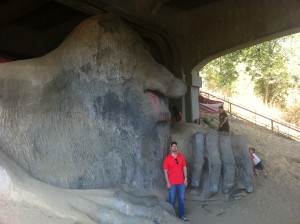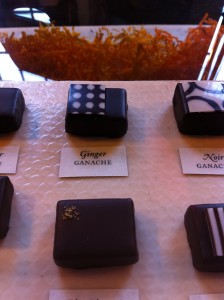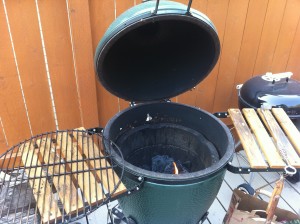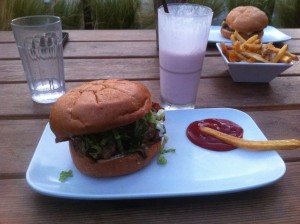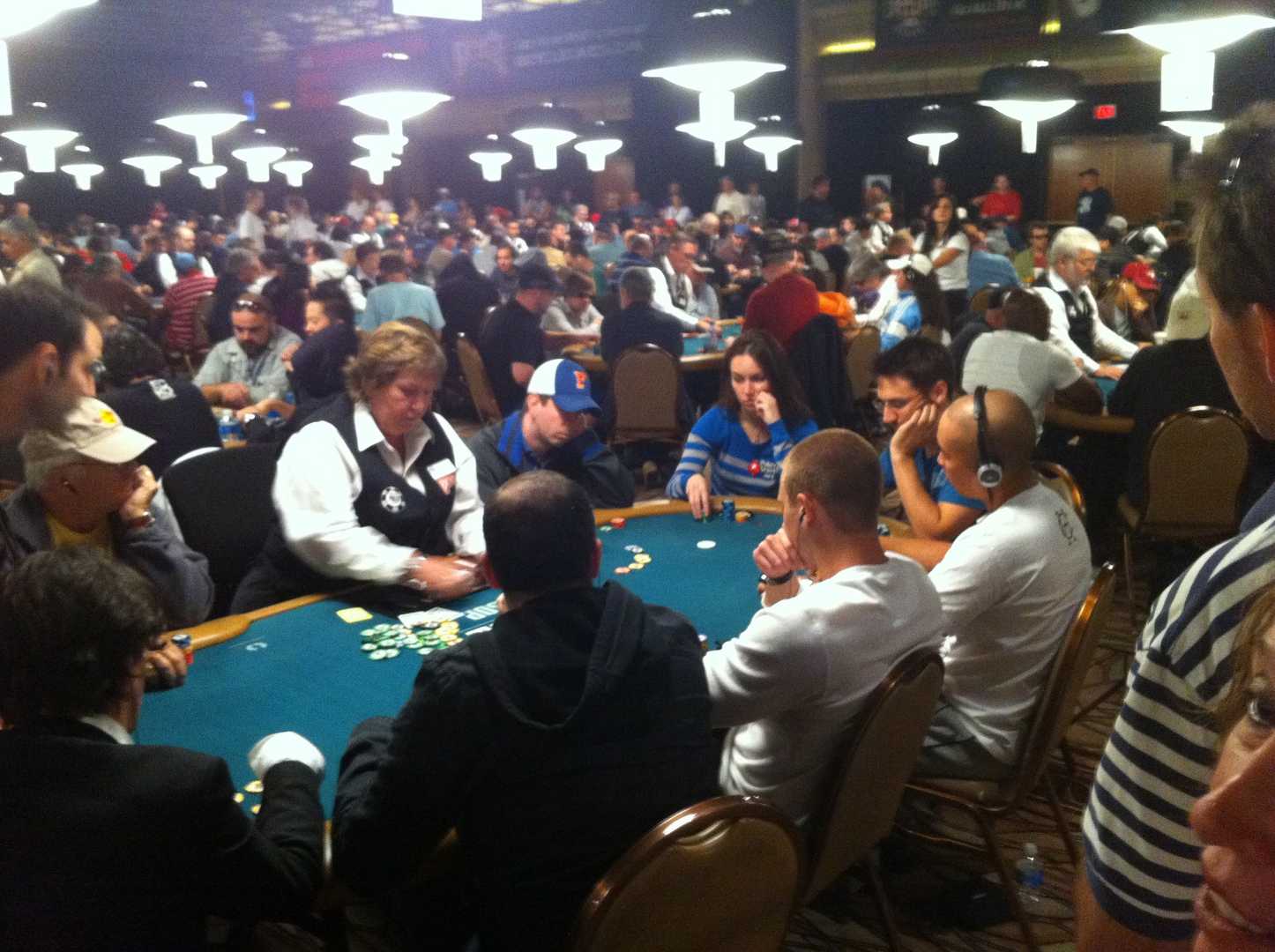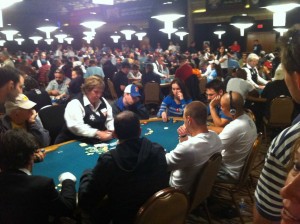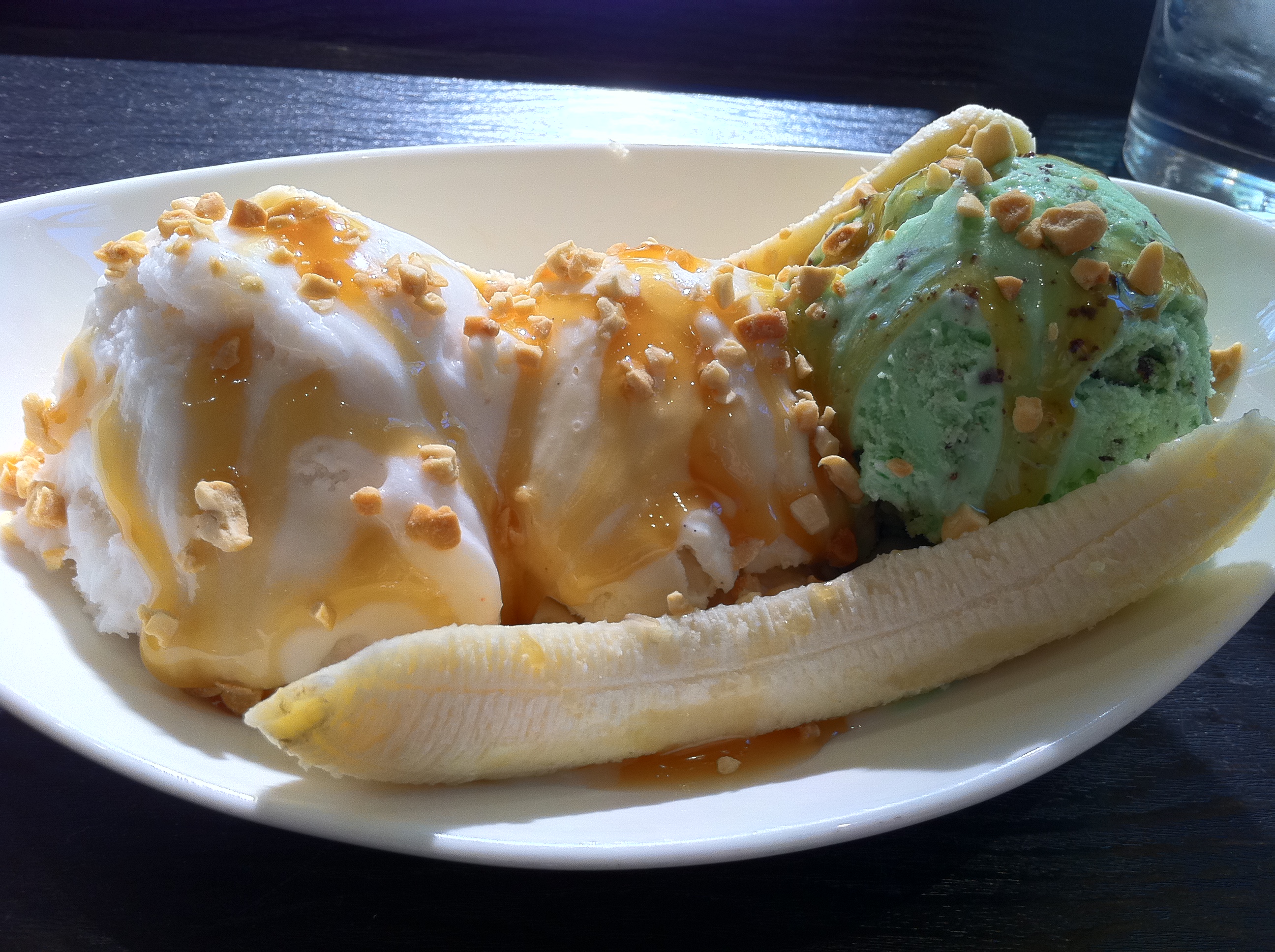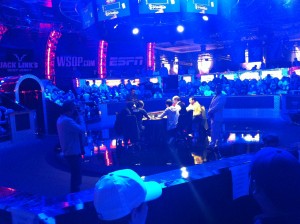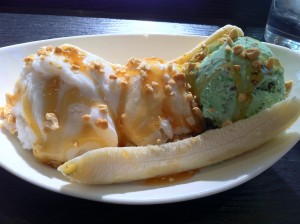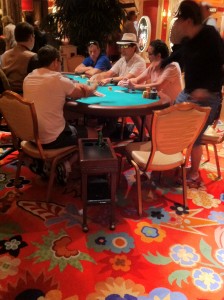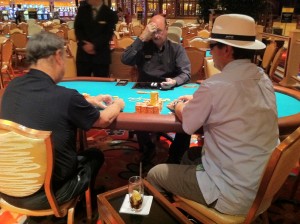
Day 1: Today started pretty rough, but got better as it went on. I went to sleep about 2:00 AM and had to be back up at 4:00 AM. My plane left Gainesville at 5:20 AM and I arrived in Seattle at 9:30 AM local time. The Muckleshoot Casino, where we’re playing three tournaments this weekend, is pretty close to the airport, so Luckbox Larry and I swung by to register for Friday’s $300 tournament (we heard it was likely to sell out). Wow, that sentence was awful. So, once that was out of the way, we headed up to Seattle so I could get settled.
Once I dropped off my stuff at Luckbox Larry’s place, I met Jimmy Trent for lunch at the Green Lake Bar & Grill. It was good to catch up on Jimmy’s life since he and his family relocated from Gainesville to Seattle. After lunch, we met up with the rest of his clan at Seattle’s version of Mochï (I can’t remember what it’s called).
On my way back to Luckbox Larry’s place, I stopped off at Herkimer Coffee (recommended by Jimmy) to pick up a couple lattes (one for me and one for Luckbox’s wifey). I figure I’m basically in the coffee capital of America (the world?), so I might as well sample the goods while I’m in town, right?
By then, my head was more or less spinning because I hadn’t had much sleep. The entire afternoon is pretty hazy, actually. I did some work on the super-long post about the big hand between Vanessa and David and then managed to get a nap on the “Futon Bed”, which is the odd combination of a futon with a giant full-size mattress on top of it. It sleeps normal-er than it sounds, so I was out for an hour or so.
Next up, we all headed off to a Team Huge (Luckbox Larry’s poker-playing crew who often visits Vegas for the 4th of July festivities) dinner party, where we had some chicken stuff, some bread, salad and corn. (Did I mention my memory gets a little fuzzy from the afternoon through the rest of the day?) Then we played a quick little poker tournament (I busted first), and finally left to head back to Luckbox’s place around 11:00 PM. By now, I’d more or less been awake for 24 hours except for a nap on the plane and another nap on the Futon Bed. I guess we drove back home and I went to sleep or something.
Day 2: I originally scheduled this to be an off day so that I could adjust to the new timezone and see a bit of Seattle. That’s more or less how the day turned out. I managed to sleep till about 8:00 AM. I considered this a coup since I was afraid my body would be stuck on East Coast time. I wandered out to find a coffee shop and landed at Lighthouse Roasters. They didn’t have WiFi, but that’s no biggie since I have MyWi on my iPhone. I spent a few hours there (more editing on the Vanessa v. David piece) and then headed back up to Luckbox’s place.
I spent a few more hours getting some work done (including some work for the next phase for this site) and then we went and got takeout at Paseo, which is a kind of Cuban-Caribbean fusion and Freemont institution. In a word: superdelicious. I had the Cuban Roast sandwich and it basically blew my socks off. Then I took a nap.
For the evening festivities, Luckbox and I decided to go play a tune-up $130 tourney at the Tulalip Casino, where they HATE, HATE, HATE bags. All bags. Do not bring a bag to our casino! Uh, so neither of us cashed in that tournament and then we left WITH OUR BAGS. Hopefully my 0/2 start isn’t a harbinger of things to come this weekend.
On the way back to the abode, we stopped in for dinner (?) at Molly Moon’s. I got a 2-scoop waffle cone with Salted Caramel and Maple Walnut. It was incredible, and quite a bit more than I was prepared to eat since Luckbox’s wife was supposed to help out, but ended up bailing because she wanted to sleep instead of eating ice cream at midnight or whatever.
Then I did some reading and went to sleep.
Day 3: We had to be up pretty early today because the $300 tourney started at 10:00 AM and we were about 45 minutes away. We dropped off Alfie and then drove down to the Muckleshoot (with a Starbucks stop on the way). We walked in just as the tournament was getting under way and it was more or less like playing poker in an igloo. I felt I played pretty well, but just ran kind of bad. I took a couple nasty beats (for example, one gentleman check-called my bet with KhQh on a J52 flop and then hit runner-runner hearts to make a flush on the river) and just had trouble getting traction. My final hand, I moved in with JJ to isolate against a late-position short-stack who had already moved all-in. Of course, another dude called my all-in with AK and he hit an ace on the flop. To add insult to injury the short stack also turned a set of sevens (although it didn’t matter for me). So, my streak of sucking at coinlfips continues and I was out somewhere around 175 of 250.
I headed over to Starbucks to kill time and ended up spending about seven hours there. I got some work done, caught up on Big Brother (yeah, I watch that show, Big whoop, wannafightaboutit?), did some reading, and wrote up this here diary.
Once Luckbox Larry busted from the tournament (narrowly missing the final table), we headed back into Seattle to meet his wife and another friend for dinner. We went to May, I great Thai place that was even greater thanks to a Restaurant.com coupon. Dinner wrapped up pretty late, so we promptly headed back to the house and called it a night.
Day 4: Today was the $500 tournament at the Muckleshoot. I’ve been running pretty badly since before I went to Vegas earlier this summer, and I was hoping my luck would finally change today. As it turned out, I was in for more of the same. I ran into a few sets (once with top pair, top kicker in a spot where I could have played for stacks but managed to lose the minimum) and ended up busting on another coinflip (QQ < AK). I think I went out with about 100 left and we started with 230 or so. This coin flip thing is getting kind of ridiculous: I'm pretty sure I've busted in about half of the last 10 tournaments on a coinflip where I was ahead and where I was the one who moved all-in. I keep getting called by overcards and they keep hitting. This isn’t a situation where I’m all-in every other hand. I’m usually all-in and called maybe two or three times per tournament. Today, I was all-in once (the hand I busted). Yesterday, I think I was all-in once (when I busted with JJ < AK) or maybe twice (I don’t remember for sure). In the WSOP Main Event, I was all-in and called twice (once when I actually won a coinflip with 99 > AQ, then on my bust-out hand with AA < KK). I'm just not all-in very often, so to be constantly busting on coin flips (especially where I'm ahead every time) is just really bad luck. Anyway, I feel that I'm playing good poker, and I'm just not getting any breaks. Tomorrow is the $1k main event, so hopefully things will turn around then. The good news is that my bad run isn't affecting my play as far as I can tell. If I keep playing good poker, I should eventually have a nice score. This afternoon I watched the Gator game online, then we went to dinner at Ray’s Cafe. We sat out on the deck, which overlooks Puget Sound. I’m not really one to talk about sunsets, but we got to see a pretty spectacular sunset:
Afterwards, we all went back to the Huge Mansion and sat around talking for a while. I got a salted caramel milkshake from Molly Moon’s and Luckbox made some kind of crazy drink concoction thing complete with rosemary and a bunch of berries–it was pretty darn good.
Time to sleep. I’m going to keep playing good poker, and hopefully I’ll have a nice score in the $1k tomorrow.
Day 5: Today was the $1k Main Event at the Muckleshoot. We were expecting a smallish field, but ended up getting about 155 entrants. This tournament turned out to be a great deal because the casino added $25k to the prize pool. That worked out to $165 or so for each player, which means we essentially played rake-free and had an overlay. Pretty good deal.
WARNING: Things are about to get poker-y here. If you don’t care about poker stuff, scroll down to where you see “BACK TO OUR REGULAR PROGRAMMING”.
The field also turned out to be a little softer than we expected. It wasn’t a crazy donkfest or anything, but there weren’t too many good, experienced players to be seen. My table was a good table (pretty soft) as I saw some players playing really big pots with relatively weak hands like top pair or even second pair. I figured if I could just catch some hands, I’d have not trouble chipping up.
Well, I did catch some hands and they were either second best or got outdrawn on the river. I had a couple funky AJ hands where I was in the blinds against a middle- or late-positionr raiser. Once, I flopped second pair (KJx board) and check-called to the river. The other guy had something like 96s and rivered trip sixes. So, my play was good – I had him betting at me as a big underdog – he just happened to get there. Another time, I flopped top pair, top kicker and check-called a bet on the flop. A king hit the turn, I checked, the guy made a very big bet and I folded. This seems a little tight, but he had already seen me pay off a few times in other hands in similar spots, AND I suspected his big bet meant business. I saw him say something to the guy next to him, and I’m pretty sure the king improved his hand. I also flopped several big draws that didn’t get there. I flopped a gutshot straight flush draw (I had AdTd on a KdQd9x board) and just called bets on the flop and turn because my opponent had raised UTG and was likely very strong. Of course I didn’t improve and had to fold to his bet on the river.
In another hand, that same dude check-called my flop bet when he had Ah8h on a Th9s2s board. I had 8s2s and had flopped a flush draw and he had flopped… ace high. Anyway, he check-called my flop bet with nothing, then he led the turn when another heart hit. I called because I had a gutshot straight draw and a flush draw. My plan was to bet the river if I missed and he checked to me. Then a heart hit the river and he led out again, so I folded and he turned over his flush. What he was doing on the flop, I don’t know. So anyway, that’s how my day was going.
I went into the first break with about 13,000 chips. This was kind of short because we started with 20,000. Obviously, I was short because I’d just been slowly losing chips in the pots I described above. The first level after the break, we would have our first ante level, and I planned to step up my aggression to start chipping up. I had seen some good spots to 3-bet light (or squeeze) and I was going to exploit the next spot I saw. The second hand after the break, I had the button and the player to my right raised to 500 (the blinds were 100/200 with a 25 ante). I 3-bet him to 1,500, the SB cold-called the raise and the original raiser also called. First of all, I should say this was my first 3-bet all day, and my image was pretty tight by this level. So, it’s a little unlucky that both of those players called this 3-bet. The flop was JcJs9c and both players checked to me. I c-bet 2,400 and both players called. The turn was a Ks, the SB checked, the guy to my right bet 11,000, I folded and the SB check-raised all-in. The SB had KK (he turned kings full) and the guy to my right had QcTc (he turned a straight plus a straight flush redraw against the other guy’s full house). The kings full held up. I like my 3-bet (it was a good time to try it), but my c-bet was a mistake: The SB was a tight player and his cold-call pre-flop should have been a red flag for me. After the hand, I knew I’d screwed up with the c-bet because the SB’s range is really small when he cold-calls my 3-bet pre-flop. I had thought maybe he cold-called with something like AK or AQs, thinking he didn’t want to 4-bet, but he also didn’t want to fold. The guy to my right could have had a pretty wide range because he was getting such good pot-odds to call my 3-bet (he had to call 1,000 to win 4,000), and a lot of his range is stuff like AK/AQ/KQ and medium pairs. So I c-bet because I thought there was a good chance they both had either big cards or medium pairs that missed the flop. But, in hindsight, the SB was obviously stronger than that here. It’s a small mistake, but it cost me 2,400 chips and I don’t like that. Also, I know it’s bugging you that I haven’t mentioned my hand – that’s because my hand didn’t matter since I had planned to 3-bet light. But if you must know, I had 8d3d (it was soooooted!).
Ok, so we fast forward two hands. I start the hand with about 8,500. The guy two seats to my right open limps (he’s done this before and I’ve raised his limp before), and I raise it to 700 (blinds still at 100/200/25) with AKo. It folds back to him and he calls. The flop is AT5, he checks, I bet 1,000 and he calls. The turn is a king, so I’ve got top two pair. He checks. There’s about 4,000 in the pot and I have about 6,500 left, so I decide to just move all-in both to protect my hand (there was a flush draw out, and possible funky straight draws) and for value (he might have a weaker ace or funky two pair, and I don’t want him getting scared off if he does have one of those hands and another big card hits the river putting a four-card straight on the board). He thinks for a while and then calls with AJo. So he needs one of four queens to knock me out, and I’m a 92% favorite to double up. If you’ve ever met me, you know that a queen hit the turn and I was out.
So, I played three tournaments at the Muckleshoot ($300, $500 and $1,000). I was all-in and called three times: JJ < AK; QQ < AK; AK < AJ on a AKT5 board. Or, in numbers: 55% favorite; 55% favorite; 92% favorite. I lost all three all-ins. It’s important to note that in all three cases, I was the one who moved all-in and my bet or raise was big enough that my opponent could legitimately fold. Yesterday, I mentioned there may have been another all-in, but I can’t remember it. You may recall that I busted from the WSOP ME with AA < KK (80% favorite) a few tournaments ago, and before that I min-cashed and had three final table bubbles at the Wynn. So I’m on a little bit of a cold streak right now.
BACK TO OUR REGULAR PROGRAMMING
After the pokerz, we headed back into Seattle and took a detour so I could finally meet The Freemont Troll. I’d been hearing about this guy since I arrived in Seattle, so it was nice to finally put the name with a face:
Yeah, that’s a VW Bug he’s crushing with his hand. A real VW Bug.
Then, Luckbox Larry and I stopped off at Theo Chocolate to get his wife a birthday present (she was kind enough to let him play the $1k main event on her birthday). Can I just say that Theo Chocolate is an amazing place where they literally just have piles of chocolate sitting around, waiting to be eaten for FREE?! It was a good thing that Luckbox Larry already basically knew what he was getting because I could’ve put away three or four pounds of chocolate with no problem if we’d stuck around long enough. It was awesome. Here’s a pic of a couple of their caramel selections:
Uh, so anyway, then we headed back to the palace and I took a nap while they went for a stroll to the market.
Some time in the evening, we all headed over to Dan (AKA, Fat Yeti of Fat Yeti Photography) and Maya’s place for a birthday dinner for Rachel (Luckbox Larry’s heretofore unnamed wife). I’d say the two highlights were the salmon that Dan cooked on his Big Green Egg (see below) and the S’mores Cake that Maya made (I’m kicking myself that I didn’t get a picture of it).
After dinner and dessert, we all went to Dan’s studio so he could show us some pretty awesome pics of him and some friends shooting giant guns. While we were browsing the gun pics, I scanned the walls and noticed some random-looking pics of people wearing a chicken head mask, but otherwise looking pretty normal. I asked Dan what was up with the mask and he said something like, “Yeah, we like to take pics of people wearing the chicken head. Do you want to take a pic wearing the chicken head?”
“Sure I do.”
That’s just one of two that we did. I’ll post the other one in its own blog post because it’s JUST THAT AWESOME.
Day 6: Today was pretty laid-back since we didn’t have any poker to play. I spent the morning over at Caffe Vita doing some writing and reading. I started “The Big Short” last week, and I’m starting to get into that.
We went for pho for lunch, but I didn’t catch the name of the place. It was good pho. Afterward, we went for gelato at another place whose name I didn’t catch. I had white chocolate and orange (one flavor) gelato and it was really good.
Then we ran some errands on foot, and ended up cruising around for about an hour, going store to store to get stuff done. It turned out to be a pretty good workout, so hopefully I burned off some of the calories I ate for lunch.
For dinner, we went for burgers at Uneeda Burger, and it was really good. We took Alfie with us, and he was just relaxing on the deck while we ate… until Bentley the local cat came along and started making trouble. Eventually, we ran Bentley off and Alfie stood his ground next time Bentley came around.
We just spent the rest of the evening chatting and I finished up re-packing my stuff for the second leg of my trip. I’m off to Vancouver at 7:40 AM!


